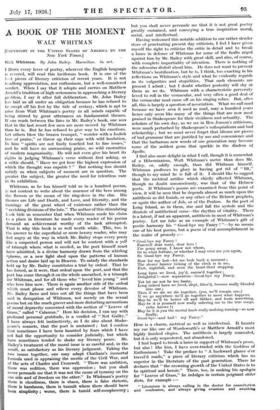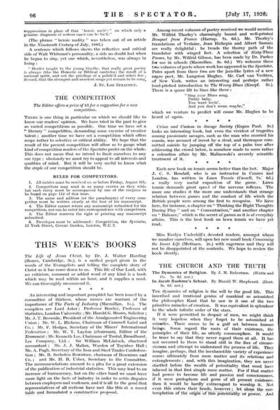A BOOK OF THE MOMENT
WALT WHITMAN
[COPYRIGHT IN THE UNITED STATES OF AMERICA BY THE New York Times.]
I HOPE every lover of poetry, wherever the English language is revered, will read this luciferous book. It is one of the te pieces of literary criticism of recent years. It is not headlong appreciation, nor enthusiasm, but a well-considered verdict. When I say that it adopts and carries on Matthew Arnold's tradition of high seriousness in approaching a literary problem, I say it after full deliberation. Mr. John Bailey has laid us all under an obligation because he has refused to be swept off his feet by the tide of ecstasy, which is apt to arise from Walt Whitman's poetry in all minds capable of being stirred by great utterances on fundamental themes. If one reads between the lilies in Mr. Bailey's book, one sees that in the last resort few men are more moved by Whitman than he is. But he has refused to give way to his emotions. Let others blow the brazen trumpet, " wonder with a foolish face of praise," or throw up their caps with wild laudation, In him " spirits are not finely touched but to fine issues," and he will have no unreasoning praise, no wild enormities of modern magnanimity. He will not even give his heart its rights in judging Whitman's verse without first asking, as a critic should, " Have we got here the highest expression of which the thought was capable ? " But nothing less should satisfy us when subjects of moment are in question. The greater the subject, the greater the need for relentless care in its exhibition.
Whitman, as he has himself told us in a hundred poems, is not content to write about the murmur of the bees among the flowers or the moan of the ring-dove in the elm. His themes are Life and Death, and Love, and Eternity, and the turnings of the great wheel of existence rather than the " ravishing divisions of the lute." The author of this stimulating Wok bids us remember that when Whitman made his claim to a place in literature he made every reader of his poems dethand an achievement worthy of the task attempted. That is why this book is so well worth while. This, too, is the answer to the superficial or mere luxury reader, who may feel angry at the way in which Mr. Bailey stops every poem like a suspected person and will not be content with a yell of triumph where what is needed, as the poet himself must have admitted, is a divine harmony drawn from the whirling spheres, or a new light shed upon the patterns of human action and desire laid up in Heaven. To satisfy the standards held up by Mr. Bailey constitutes a trial by ordeal. That he has forced, as it were, that ordeal upon the poet, and that the poet has come through it on the whole unscathed, is a triumph for Whitman, and for all those who " loved him young " and who love him now. There is again another side of the ordeal which must please and relieve every devotee of Whitman. Mr. Bailey faces and tries out all the things that have been said in derogation of Whitman, not merely on the sexual poems but on the much graver and more disturbing accusations of moral depravity concerned with the section of " Leaves of Grass," called " Calamus." Here his decision, I can say with profound personal gratitude, is a verdict of " Not Guilty." I have always felt instinctively, as I do also about Shake- peare's sonnets, that the poet is unstained ; but I confess that sometimes I have been haunted by fears which I have not had the opportunity to consider judicially, but which have sometimes tended to shake my literary peace. Mr. Bailey's treatment of the moral issue is as careful and, in the result, as satisfactory as his literary judgment. Taking the two issues together, one may adapt Chatham's immortal formula used in appraising the merits of the Civil War, and of the acts of Charles and Cromwell. " There was ambition, there was sedition, there was oppression ; but you shall never persuade me that it was not the cause of tyranny on the one side and of freedom on the other." In Whitman's poetry there is cloudiness, there is chaos, there is false rhetoric, there is harshness, there is tumult where there should have been simplicity ; worse, there is tumid self-complacency ; but you shall never persuade inc that it is not great poetry greatly sustained, and conveying a true inspiration moral, social, and intellectual.
Having welcomed this notable addition to our rather slender store of penetrating present day criticism, I feel I have given myself the right to criticize the critic in detail and to break a lance in defence of Whitman for some of the faults urged against him by Mr. Bailey with great skill, and also, of course, with complete impartiality of intention. There is nothing of the advocatus diaboli about him. He does not want to prevent Whitman's beatification, but he is, I think, too exacting in his reflections on Whitman's style and what he evidently regards as its vulgarities and stupidities. That such elements are present I admit ; but I doubt whether posterity will shy at them as we do. Whitman with a characteristic perversity loved to roll in the vernacular, and very often a good deal of the vernacular mud came off on his singing robes. But, after all, this is largely a question of association. What we call mud because we have seen it used as mud, may a hundred years hence only seem like many of the things that are now most praised in Shakespeare for their vividness and actuality. The scholars of his own day, as we see in Ben Jonson's criticisms, were much perturbed by Shakespeare's colloquialisms and bad scholarship ; but we must never forget that idioms are pieces of bad grammar that are justified by use and convenience and that the barbarous new words of one generation may become some of the noblest gems that sparkle in the diadem of Apollo.
I find also more delight in what I call, though it is somewhat of a Hibernianism, Walt Whitman's metre than does Mr. Bailey, or, oddly enough, than did Whitman himself. Whitman professes to glory in having got rid of " lilt," though to my mind he is full of it. I should like to suggest that the metrical artifice which chiefly affected Whitman, though no doubt unconsciously, was that of the Hebrew poets. If Whitman's poems are examined from this point of view, it will be seen that he depends almost as much upon the antithesis as did Isaiah, or any other of the Hebrew prophets, or again the author of Job, or of the Psalms. In the poet of Long Island, as in them, rise and fall the systole and the diastole of antithetical verse—the rhythm of vitality. There is a latent, if not an apparent, antithesis in most of Whitman's poetry. Let me take as an example of Whitman's gift of poetic harmony his " Good-bye my Fancy "—by no means one of his best poems, but a poem of real accomplishment in the realm of prosody :- " Good-bye my Fancy ! Farewell dear mate, dear love I'm going away, I know not where,
Or to what fortune, or whether I may ever see you again,
So Good-bye my Fancy.
Now for my last—let me look back a moment ; The slower fainter ticking of the clock is in me, Exit, nightfall, and soon the heart-thud stopping.
Long have we lived, joy'd, caress'd together ; Delightful !—now separation—Good-bye my Fancy.
Yet let me not be too hasty, Long indeed have we lived, slept, filter'd, become really blended into one ; Then if we die we die together, (yes, we'll remain one,) If we go anywhere we'll go together to meet what happens, May-be we'll be better off and blither, and learn something, May-be it is yourself now really ushering me to the true songs, (who knows ?) May-be it is you the mortal knob really undoing, turning—so now finally, Good-bye—and hail ! my Fancy."
Here is a charm, metrical as well as intellectual. It haunts my ear like one of Wordsworth's or Matthew Arnold's most highly finished elegies. The antithesis is largely concealed, but it is only sequestered, not abandoned.
I had hoped to break a lance in support of Whitman's prose, but alas ! like him, I have over-traded with the Goddess of Enthusiasm ! Take the preface to " A backward glance o'er travel'd roads," a piece of literary criticism which has no superior in the literature of the past generation. There he declares that " the crowning growth of the United States is to be spiritual and heroic." There, too, in making his apologia for " Leaves of Grass," he indulges in certain poignant °biter dicta, for example :-
" Literature is always calling in the doctor for consultation and confession, and always giving evasions and swathing suppressions in place of that ' heroic nuii`-- ' on which only a genuine diagnosis of serious cases can be bu it."
.(The phrase " heroic nudity " was taken out of an article in the Nineteenth Century of July, 1883.)
A sentence which follows shows the reflective and critical side of Walt Whitman's personality, a side no doubt lost when he began to sing, yet one which, nevertheless, was always in being : " Herder taught to the young Goethe, that really great poetry is always (like the Homeric -or -Biblical canticles) the result of a national spirit, and not the privilege of a polish'd and select few ; Second, that the strongest and sweetest songs yet remain to be sung,
J. Sr. LOE STRACHEY.











































 Previous page
Previous page